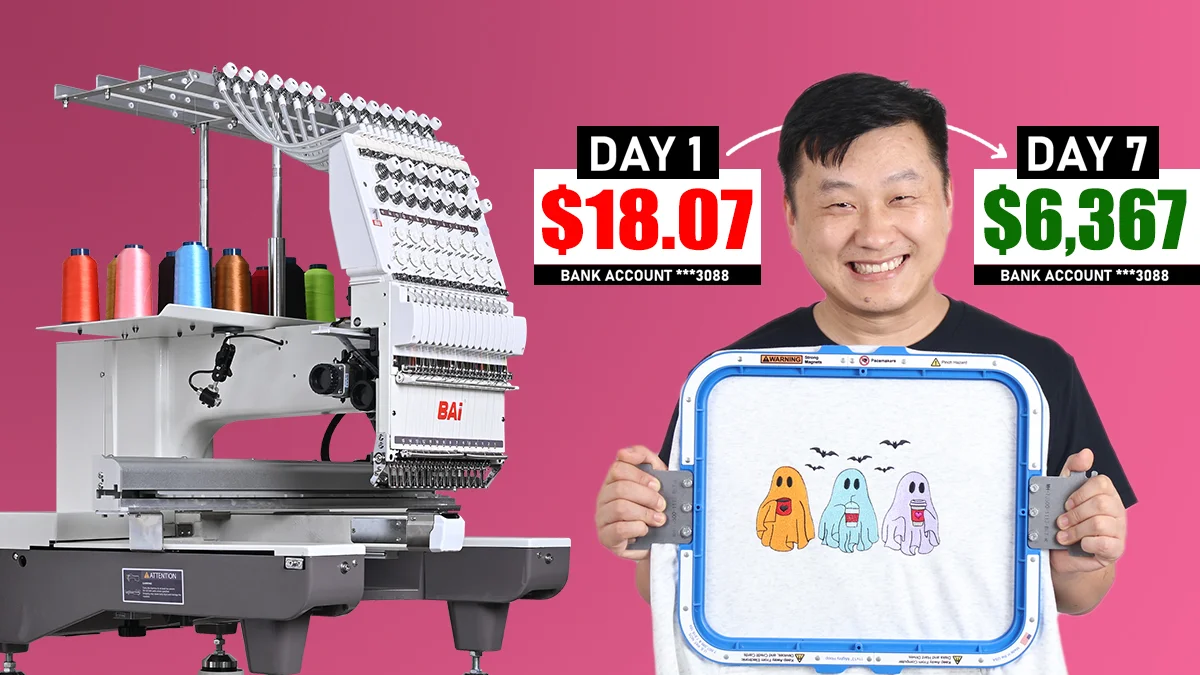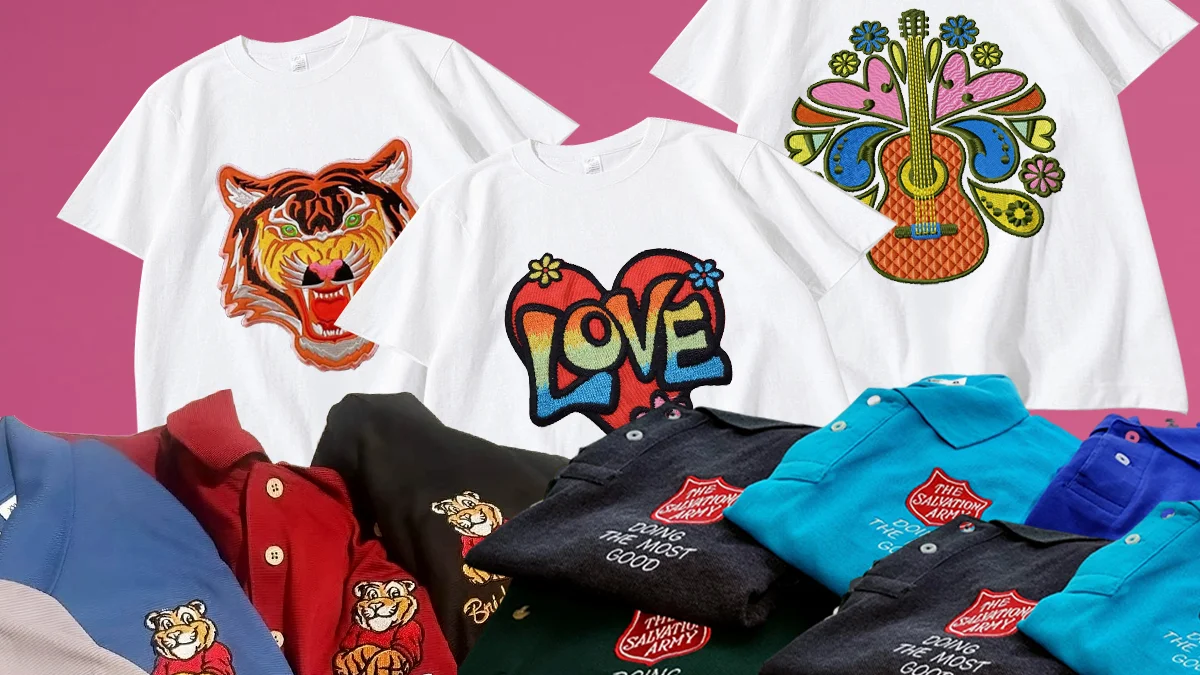
BAi will be present at Impressions Expo 2024
2024-10-18
Embroidery Machine Needle Skipping Troubleshooting and Solutions
2024-11-01BUSINESS TIPS
Profitable T-Shirt Embroidery Business
POSTED ON OCTOBER 25th,2024 BY BAi

In today's fashion-forward world, custom clothing has become a popular trend. Whether it's customized corporate attire, event memorabilia, or personalized fashion statements, embroidered T-shirts demonstrate significant market potential. This article delves into the thriving industry of T-shirt embroidery, exploring its potential, advantages, and how to start an embroidery business for T-shirts. Let's dive in and explore!
#1 Overview of the T-Shirt Embroidery Market
The T-shirt embroidery market has seen vigorous growth in recent years, driven primarily by the trends of personalization and customization in consumer behavior. Consumers increasingly seek uniqueness and self-expression, making embroidered T-shirts with distinctive designs a fashion trend. Here are some key trends in the market:
-1 Personalized Demand
Personalized demand is a major driver of growth in the T-shirt embroidery market. More and more consumers want to express their personality and style through customized T-shirts. This demand is prevalent not only among younger demographics but also across various age groups.
- Unique Designs: Consumers seek one-of-a-kind designs to showcase their personal style.
- Personal Expression: Custom T-shirts are used to express personal interests, hobbies, and beliefs.
-2 Corporate Customization
Corporate customization is also a significant component of the T-shirt embroidery market. Many businesses require T-shirts customized with company logos and slogans for employee uniforms and promotional activities.
- Brand Promotion: Custom T-shirts serve as a tool for brand promotion and advertising.
- Employee Uniformity: Providing employees with uniform T-shirts enhances corporate image.
-3 Group Activities
Schools, clubs, and other organizations often require customized T-shirts for events and competitions. Such demands typically involve larger order volumes.
- Event Memorabilia: Customized T-shirts are used as memorabilia for events and competitions.
- Team Building: Uniform T-shirts help strengthen team cohesion.
#2 Competitive Advantages of Embroidered T-Shirts
In the fiercely competitive apparel market, embroidered T-shirts stand out with their unique craftsmanship and aesthetic qualities, providing significant differentiation and competitive advantages. Here are the primary advantages that make embroidered T-shirts prominent in the market:
-1 Group Activities
One of the key advantages of embroidered T-shirts is their durability. The use of high-quality embroidery threads ensures they withstand frequent washing and wear. Unlike printed designs that may fade or crack over time, embroidery maintains its appearance for a longer period.
Compared to printed T-shirts, embroidered T-shirts typically offer a more professional and refined appearance. This makes them an excellent choice for corporate uniforms, promotional items, and team apparel.
-2 Uniqueness and Personalization
Embroidered T-shirts add unique charm and personalized elements through exquisite embroidery designs. Consumers can customize T-shirts according to their preferences, meeting the demand for personalization and self-expression.
-3 Rich Texture and Visual Appeal
Embroidery patterns provide a three-dimensional texture and tactile sensation, with vivid colors and clear lines that enhance visual appeal. They attract more attention compared to flat printed patterns, enhancing the aesthetic and artistic value of T-shirts.
-4 Versatile Applications
Embroidered T-shirts find wide application in various settings such as corporate uniforms, team apparel, event memorabilia, and gifts. They play a crucial role in corporate branding, team cohesion, event promotion, and souvenir distribution, catering to diverse market needs.
#3 Profit Models for Embroidered T-Shirt Business
The profit models for embroidered T-shirt businesses can be constructed and optimized from various aspects. Here are some key profit models:
-1 High Value-added Products
- Personalized Designs: Offer highly personalized design services to customize unique embroidery patterns and styles according to customer preferences. Advanced customization services can command higher fees.
- Limited Edition Products: Introduce limited edition embroidered T-shirts to create scarcity and uniqueness, attracting consumer attention and enhancing product premium.
- Collaborations: Partner with renowned designers, brands, or celebrities to launch collaborative embroidered T-shirts, leveraging the partner's brand influence to increase market appeal and pricing.
-2 Corporate and Group Customization
- Corporate Uniforms: Provide customized embroidered T-shirt services for companies, including company logos, slogans, etc., to enhance corporate image and employee cohesion.
- Promotional Gifts: Offer embroidered T-shirts as promotional gifts for companies to facilitate brand promotion and customer appreciation.
- Team Apparel: Provide customized embroidered T-shirts for schools, sports teams, clubs, etc., to enhance team cohesion and identity.
- Event Memorabilia: Offer customized embroidered T-shirts as memorabilia for various events (e.g., concerts, marathons) to increase participant satisfaction and event impact.
-3 Retail and E-commerce Sales Models
- Own Retail Stores: Operate own retail stores to directly sell embroidered T-shirts to consumers.
- Distribution Networks: Establish online stores or operate on well-known e-commerce platforms to utilize the internet and e-commerce channels for sales.
-4 Continuous Innovation and Optimization
- 3D Embroidery: Introduce new techniques like 3D embroidery to launch more dimensional and unique embroidery patterns, attracting consumer attention.
- Environmentally Friendly Materials: Use eco-friendly threads and fabrics to meet consumer demand for health and environmental protection, enhancing brand image and product competitiveness.

#4 How to Start an Embroidered T-Shirt Business
Starting an embroidered T-shirt business is a comprehensive project that involves multiple aspects, from market research and equipment procurement to product pricing and marketing sales. Here are some key steps to consider:
-1 Market Research
Market research is the first step in any business venture. Through market research, you can understand market demand, competition, and the preferences of potential customers.
- Target Market: Identify your target market, such as young people, businesses, schools, sports teams, etc.
- Competitive Analysis: Study existing competitors to analyze their products, pricing strategies, market positioning, and marketing methods.
- Demand Analysis: Use methods like surveys, social media interactions, etc., to understand potential customers' preferences and demand for embroidered T-shirts. Determine the most popular designs, colors, and styles.
-2 Develop a Business Plan
Develop a detailed business plan to provide clear direction and guidance for business development.
- Business Model: Decide whether to focus on online sales, physical store sales, or both. Consider offering customization services.
- Financial Budget: Estimate startup costs, including equipment purchases, raw materials, marketing expenses, and operating costs.
- Revenue Forecast: Based on market research findings, forecast sales revenue and profits. Set short-term and long-term financial goals.
-3 Purchasing Equipment and Supplies
To start an embroidery business, you'll need appropriate equipment and supplies. Here's a list of essential items:
- Embroidery Machine: Invest in a high-quality embroidery machine that suits your business needs. Consider factors such as the number of needles, hoop sizes, and digital capabilities.
- Embroidery Supplies: Stock up on various colors and sizes of embroidery threads and needles. Purchase different types of stabilizers to accommodate different types of fabrics. Also, acquire embroidery hoops in different sizes.
- Embroidery Software: You may need software to design and digitize your artwork.
-4 Pricing Your Products
Effectively pricing your products is crucial for profitability and positioning your online T-shirt business effectively in the market. It balances covering costs, attracting customers, and competing successfully with other brands.
To price your T-shirts effectively, follow these steps:
- Calculate Production Costs: Determine fixed costs (e.g., rent, wages, or machinery) and variable costs (e.g., materials, ink, and designs). Use the following formula: Total Product Cost = Fixed Costs + Variable Costs.Then, divide the total product cost by the number of units produced to get the cost per unit.
- Choose a T-shirt Pricing Strategy: A well-crafted pricing strategy can enhance profitability, guide the business in adapting to market changes, influence customer perceptions, and drive revenue growth. Popular T-shirt pricing strategies include:
- Markup Pricing: To achieve desired profit margins, add this percentage to your production costs. For example, if the production cost is $10 and the markup is 35%, the T-shirt price would be $13.50.
- Keystone Pricing: Double the production cost for a 100% markup. A $10 cost would result in a price of $20.
- Competitive Pricing: Set prices by comparing with competitors, deciding whether to price higher to offer premium products or lower to attract budget-conscious buyers.
-5 Marketing and Sales
Effective marketing and sales strategies can help you quickly capture the market and attract customers.
- Brand Creation: Develop a unique brand identity and style to establish your brand image.
- Online Platforms: Create an online store using platforms like Shopify, Etsy, etc. Ensure the website design is appealing and offers a good user experience.
- Social Media: Utilize platforms such as Instagram, Facebook, etc., to promote your products, share new product information, and customer reviews to increase brand exposure.
- Offline Sales: Participate in local markets, trade shows, and events to interact directly with customers and expand visibility.
The embroidery t-shirt business demonstrates significant profit potential due to its high added value, personalized customization, and wide market demand. Through appropriate pricing strategies, effective marketing promotion, high-quality products and services, and ongoing innovation and optimization, the embroidery t-shirt business can stand out in a fiercely competitive market. Whether for small entrepreneurs or large corporations, seizing market opportunities and accurately targeting the customer base can lead to steady growth and substantial profits in the embroidery t-shirt business.
In conclusion, the embroidery t-shirt business not only meets consumers' demands for personalization and quality but also demonstrates robust market vitality and promising development prospects through diversified profit models and flexible business strategies. Looking ahead, with continuous technological advancements and growing market demand, the embroidery t-shirt business will embrace even brighter prospects, becoming an indispensable part of the fashion industry.
-1.png)

